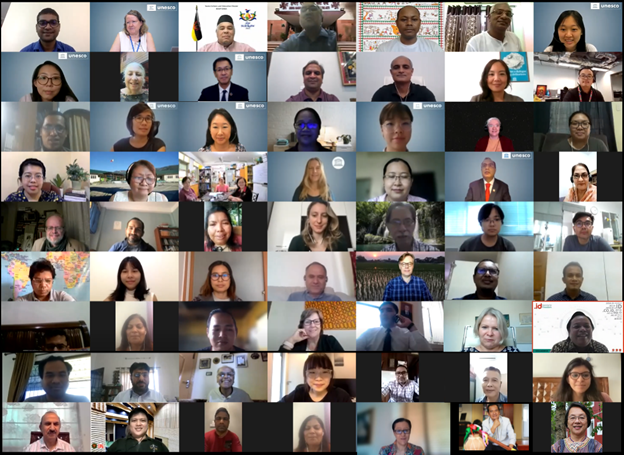ECOSF Joins the UNESCO Regional Consultation in Asia for Preparation of the Global Action Plan for the International Decade of Indigenous Languages (IDIL) 2022-2032
Go Back

UNESCO Bangkok Regional Bureau for Education, with the support of UNESCO Headquarters and Offices in Jakarta, New Delhi and Beijing virtually organized a regional consultation of a diverse range of stakeholders, including representatives of the national governments, indigenous peoples, and organizations, international organizations, as well as academics and experts on indigenous languages, linguistic diversity and multilingualism on 10-11 May 2021 for the preparation of the Global Action Plan for the International Decade of Indigenous Languages (IDIL) 2022-2032.
A large number of researchers, scholars, experts, linguists, academia, students, etc attended the event. From ECOSF, President Prof. Manzoor Hussain Soomro and Assistant Director Mr. Ghulam Abbas Rahar participated in the event. Prof. Soomro made a few interventions and contributions in the online sessions.
During the opening session, renowned experts/linguists such as Manoch Chummuangpak, Dhurakij Pundit University, Member State Representative of the Global Task Force, Thailand; Anabel Benjamin Bara, Representative of Indigenous People's Organizations, Global Task Force, India; Katia Chirizzi, Deputy Regional Representative, OHCHR Regional Office for South-East Asia and Shigeru Aoyagi, Director, Asia and Pacific Regional Bureau for Education, UNESCO Bangkok, talked about the history and importance of local languages in the world.
The keynote speech was made by Mrs. Victoria Tauli-Corpuz, former UN Special Rapporteur on the rights of indigenous peoples, The Philippines. She talked about the fundamental rights of the people of the world to learn, own and communicate in their local languages. She said that UN has been promoting local languages throughout the world. In this regards, UNESCO, the specialized agency of UN, has been playing its pivotal role.

Panel discussion sessions were also arranged to discuss the Safeguarding and revitalizing indigenous languages in Asia for sustainable development and defining the regional priorities: vision, outcomes, targets, key principles, stakeholders, thematic considerations and regional priorities. The experts such as Indu Chaudhary, Tharu Welfare Congress, Representative of Indigenous People's Organizations, Global Task Force, Nepal; Yudho Giri Sucahyo, Chairman of PANDI (Indonesian Internet Domain Name Registry), Indonesia; Suwilai Premsrirat, Founding Director of the Resource Center for Documentation, Revitalization and Maintenance of Endangered Languages and Cultures, Research Institute for Languages and Cultures of Asia, Mahidol University, Thailand; Masahiro Yamada, Associate Professor, National Institute for Japanese Language and Linguistics, Japan discussed various aspects for promoting the indigenous languages. The experts were of the opinion that new technologies, research, engagement of youth, capacity development, policymaking, patronage of the governments, etc is very much needed for the survival and growth of the indigenous languages.
From Pakistan quite a strong contingent of the Indus Cultural Forum (ICF) also joined the consultations; those include Mr. Munawar Hassan Chairman ICF and Board Members Mr. Niaz Nadeem, Prof. Manzoor Soomro and Ms. Nusrat Zahra. All members made good contribution during the main and breakout sessions; Mr. Munawar Hassan and Mr. Niaz Nadeem let two separate breakout groups and presented the outcomes in the final plenary session.
The main objective of the regional consultation was to contribute to the development of the Global Action Plan for the International Decade of Indigenous Languages (IDIL) 2022-2032. This involved identification of regional priorities aligned to the guiding strategic framework of the future Global Action Plan in language transmission, documentation, safeguarding, policy development, education, research, and promotion, identification of future regional activities which would contribute to the implementation of the Global Action Plan, and awareness-raising on the importance of indigenous languages, linguistic diversity and multilingualism for sustainable development.
The consultation also aimed to provide an opportunity to forge new partnerships among various stakeholders for the establishment of a regional network of partners, national committees, and focal points for the implementation of the IDIL2022-2032 in the region
The consultative meeting was concluded with:
- Recommendations and adoption of regional priorities for the IDIL (2022-2032),
- Contribution to the Global Action Plan proposed by UNESCO in the context of IDIL2022-2032,
- List of potential activities at the regional level for the elaboration of flagship and pilot projects, and
- List of key partners at national and regional levels for the establishment of networks.